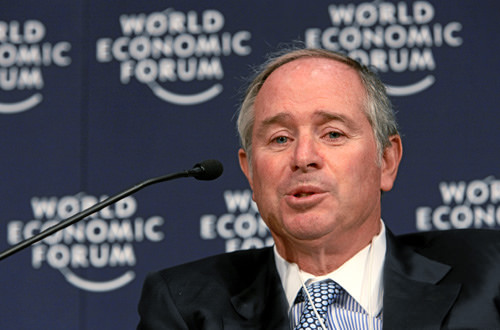Business
Private Equity Goliath Blackstone Breaks $1 Trillion Barrier - Firm Unloads Office Buildings, Malls
By Belal Awad · August 4, 2023
In brief…
- Blackstone CEO Stephen Schwarzman said his $1 trillion firm has shifted its asset portfolio away from struggling sectors like office buildings and shopping centers to more profitable areas like warehouses and data centers.
- Schwarzman praised the Federal Reserve's handling of inflation.
- He noted the surprising resilience of the U.S. economy with 2.4% growth in the last quarter.
- He believes a recession can be avoided if inflation continues to decline and full employment is maintained.

Setting a new mark in private equity, Blackstone has become the industry’s first firm to clear $1 trillion dollars in asset value. For this highly lucrative corner of the investment world, Blackstone’s achievement is akin to breaking the sound barrier.
Stephen Schwarzman, who has led Blackstone since its inception in 1985, told CNBC how he has kept the firm profitable over the last 38 years through ongoing strategic reallocations of its investment portfolio. Schwarzman is now in the process of shifting Blackstone’s vast real estate investments out of office buildings and shopping centers, which have faced huge declines as a result of Covid and the advent of virtual offices, into more profitable areas such as warehouses and data centers.
“We had tons of office buildings,” said Schwarzman. “Seventy percent of what we owned - today in the United States - we [now] only own 2% of that problem area.”
Schwarzman said Blackstone’s strategic shift began in the late 2010s, when the firm noticed declining cash flows from commercial office buildings. He emphasized the importance of being in the right sub-asset classes in real estate, citing the firm’s success with resort hotels and warehouses, which have seen a 12% to 14% increase in annual rents.
“We were finding that that the cash flows coming off of those buildings weren’t what they used to be - the cost of running them, capital expenditures, other things. We decided that we should really lighten up. And we did. We made a huge switch. We switched out of shopping centers around 2015.”
On predictions of an economic downturn and higher interest rates, Schwarzman said Blackstone has prepared its portfolio companies for such scenarios. At the same time, he pointed to the surprising resilience of the U.S. economy, which grew 2.4% in the last quarter, confounding those who have forecast recession.
Schwarzman also touched on the topic of inflation, saying the odds of negative growth have significantly diminished. “We’ve been talking early that inflation was way more than the government was reporting. And then we started talking about the fact that inflation was going down much more than the government thought,” he said.
Praising the Federal Reserve’s handling of an uncertain economy, Schwarzman said, “There was just a report of 3% inflation that in no way surprised us. And so it looks like the Fed is actually doing a pretty remarkable job, contrary to what people might have thought. And if inflation continues to go down, we have full employment. Then we may be able to skirt a recession.”